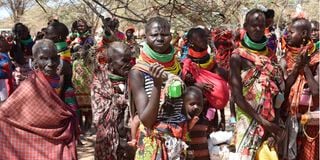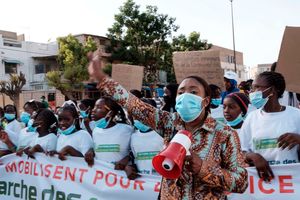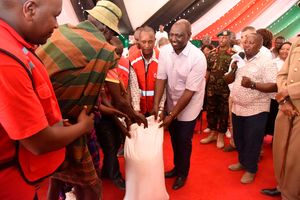Climate-related health crisis worsens as disease outbreaks surge

Members of the public wait for their rations of relief food distribution by President William Ruto to hunger victims due to prolonged drought, at Nakaalei in Turkana on November 5, 2022.
What you need to know:
- Outbreaks of anthrax, measles, cholera, yellow fever, chikungunya, meningitis, and other infectious diseases account for more than 80 per cent of the acute public health events reported, with drought, flooding and other disasters accounting for 18 per cent.
- The already dire situation has deepened a health crisis in this region where 47 million people are already facing acute hunger.
A new World Health Organization (WHO) study has found that the number of reported disease outbreaks and climate-related health emergencies in the greater Horn Africa have reached their highest-ever level this century.
Analysis of the seven countries in the greater Horn of Africa - Djibouti, Ethiopia, Kenya, Somalia, South Sudan, Sudan and Uganda – recorded 39 reported outbreaks, flooding and other acute public health events between January 1 and October 30, 2022.
This is even as Kenya faces its worst drought in 40 years., with four consecutive failed rainy seasons causing crippling food insecurity and malnutrition.
Outbreaks of anthrax, measles, cholera, yellow fever, chikungunya, meningitis, and other infectious diseases account for more than 80 per cent of the acute public health events reported, with drought, flooding and other disasters accounting for 18 per cent.
The already dire situation has deepened a health crisis in this region where 47 million people are already facing acute hunger.
Most parts of the region are battling the worst drought in at least 40 years, with an unprecedented fifth rainy season failure now anticipated, while other parts face flooding and conflict.
While insisting that it is critical world leaders reach agreement on stemming the rise in temperatures at the 27th United Nations Climate Change conference (COP27), Dr Matshidiso Moeti, WHO Regional Director for Africa, said the failure of four consecutive rainy seasons has scorched the earth and pushed people out of their homes in search of food and water.
Furthermore, millions of children under the age of five years are estimated to be facing acute malnutrition, increasing their risk of not only starvation, but also of severe outcomes during a disease outbreak due to weakened immunity.
“The dire conditions in the greater Horn of Africa are a perfect storm for outbreaks, which unless we act quickly will flare up with increasing intensity. To mount an effective emergency response to the crisis on our doorstep, we need up to Sh15 billion (US$124) million, but have only received 34 per cent of our request up to now,” added Dr Moeti.”
In response to the deepening health crisis, WHO has mobilised over Sh850 million (US$7 million) in supplies and equipment for the greater Horn of Africa including 0ver Sh360 million (US$3 million) in kits to severe malnutrition, or diseases such as cholera and measles.
The organisation has also trained thousands of health workers across the region on the management of acute malnutrition.
But still, more needs to be done as the organisation is calling for support for the food insecurity response in the region. “We need more essential medical equipment and supplies, vaccines, medicines, and kits to support essential health services. We must step up critical actions like vaccinations and improve surveillance to prevent outbreaks from getting out of hand,” added Dr Egmond Evers, acting Incident Manager, WHO greater Horn of Africa response.





